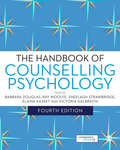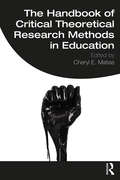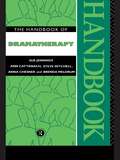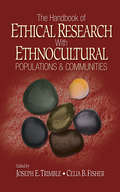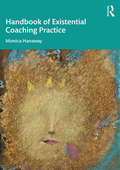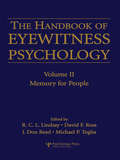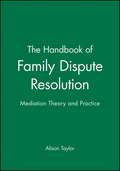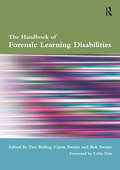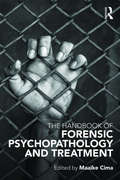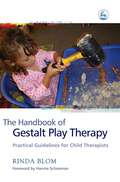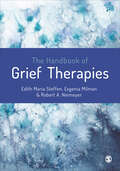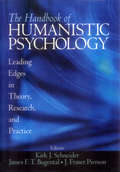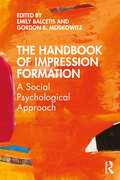- Table View
- List View
The Handbook of Counselling Psychology
by Barbara Douglas Ray Woolfe Elaine Kasket Sheelagh Strawbridge Victoria GalbraithThis fourth edition provides the most comprehensive guide to the field of counselling psychology, exploring a range of theories and philosophical underpinnings, practice approaches and contexts, and professional issues. It has been updated to reflect current issues and debates and to map onto the training standards, and offers the ultimate companion for your journey through counselling psychology training and into the workplace. New to the fourth edition: Chapters on: Person-Centred Therapy; Mindfulness; Neuroscience; Engaging with and Carrying out Research; Reflective Practice; International Dimensions; and Ecopsychology A companion website offering hours of video and audio, including conversations with counselling psychology practitioners and trainees, and articles, exercises and case studies Other new features include: Further Reading, ‘Day in the Life of’ dialogues with practitioners; Reflective Exercises, and Discussion Points, and new case studies. Special attention has been paid to the topic of research, both as a theme throughout the book, and through four new chapters covering the use, carry out and publication of research at different stages of training and practice. The handbook is the essential textbook for students and practitioners in the field of counselling psychology and allied health professions, at all stages of their career and across a range of settings, both in the UK and internationally.
The Handbook of Counselling Psychology
by Barbara Douglas Ray Woolfe Elaine Kasket Sheelagh Strawbridge Victoria GalbraithThis fourth edition provides the most comprehensive guide to the field of counselling psychology, exploring a range of theories and philosophical underpinnings, practice approaches and contexts, and professional issues. It has been updated to reflect current issues and debates and to map onto the training standards, and offers the ultimate companion for your journey through counselling psychology training and into the workplace. New to the fourth edition: Chapters on: Person-Centred Therapy; Mindfulness; Neuroscience; Engaging with and Carrying out Research; Reflective Practice; International Dimensions; and Ecopsychology A companion website offering hours of video and audio, including conversations with counselling psychology practitioners and trainees, and articles, exercises and case studies Other new features include: Further Reading, ‘Day in the Life of’ dialogues with practitioners; Reflective Exercises, and Discussion Points, and new case studies. Special attention has been paid to the topic of research, both as a theme throughout the book, and through four new chapters covering the use, carry out and publication of research at different stages of training and practice. The handbook is the essential textbook for students and practitioners in the field of counselling psychology and allied health professions, at all stages of their career and across a range of settings, both in the UK and internationally.
The Handbook of Critical Theoretical Research Methods in Education
by Cheryl E. MatiasThe Handbook of Critical Theoretical Research Methods in Education approaches theory as a method for doing research, rather than as a background framework. Educational research often reduces theory to a framework used only to analyze empirically collected data. In this view theories are not considered methods, and studies that apply them as such are not given credence. This misunderstanding is primarily due to an empiricist stance of educational research, one that lacks understanding of how theories operate methodologically and presumes positivism is the only valid form of research. This limited perspective has serious consequences on essential academic activities: publication, tenure and promotion, grants, and academic awards. Expanding what constitutes methods in critical theoretical educational research, this edited book details 21 educationally just theories and demonstrates how theories are applied as method to various subfields in education. From critical race hermeneutics to Bakhtin’s dialogism, each chapter explicates the ideological roots of said theory while teaching us how to apply the theory as method. This edited book is the first of its kind in educational research. To date, no other book details educationally just theories and clearly explicates how those theories can be applied as methods. With contributions from scholars in the fields of education and qualitative research worldwide, the book will appeal to researchers and graduate students.
The Handbook of Culture and Biology
by José M. Causadias Eva H. Telzer Nancy A. GonzalesA comprehensive guide to empirical and theoretical research advances in culture and biology interplay Culture and biology are considered as two domains of equal importance and constant coevolution, although they have traditionally been studied in isolation. The Handbook of Culture and Biology is a comprehensive resource that focuses on theory and research in culture and biology interplay. This emerging field centers on how these two processes have evolved together, how culture, biology, and environment influence each other, and how they shape behavior, cognition, and development among humans and animals across multiple levels, types, timeframes, and domains of analysis. The text provides an overview of current empirical and theoretical advances in culture and biology interplay research through the work of some of the most influential scholars in the field. Harnessing insights from a range of disciplines (e.g., biology, neuroscience, primatology, psychology) and research methods (experiments, genetic epidemiology, naturalistic observations, neuroimaging), it explores diverse topics including animal culture, cultural genomics, and neurobiology of cultural experiences. The authors also advance the field by discussing key challenges and limitations in current research. The Handbook of Culture and Biology is an important resource that: Gathers related research areas into the single, cohesive field of culture and biology interplay Offers a unique and comprehensive collection from leading and influential scholars Contains information from a wide range of disciplines and research methods Introduces well-validated and coherently articulated conceptual frameworks Written for scholars in the field, this handbook brings together related areas of research and theory that have traditionally been disjointed into the single, cohesive field of culture and biology interplay.
The Handbook of Disgust Research: Modern Perspectives and Applications
by Philip A. Powell Nathan S. ConsedineThis volume brings together the world's leading experts on disgust to fully explore this understudied behavior. Disgust is unique among emotions. It is, at once, perhaps the most “basic” and visceral of feelings while also being profoundly shaped by learning and culture. Evident from the earliest months of life, disgust influences individual behavior and shapes societies across political, social, economic, legal, ecological, and health contexts. As an emotion that evolved to prevent our eating contaminated foods, disgust is now known to motivate wider behaviors, social processes, and customs. On a global scale, disgust finds a place in population health initiatives, from hand hygiene to tobacco warning labels, and may underlie aversions to globalization and other progressive agendas, such as those regarding sustainable consumption and gay marriage.This comprehensive work provides cutting‐edge, timely, and succinct theoretical and empirical contributions illustrating the breadth, rigor, relevance, and increasing maturity of disgust research to modern life. It is relevant to a wide range of psychological research and is particularly important to behavior viewed through an evolutionary lens, As such, it will stimulate further research and clinical applications that allow for a broader conceptualization of human behavior.The reader will find:Succinct and accessible summaries of key perspectivesHighlights of new scientific developmentsA rich blend of theoretical and empirical chapters
The Handbook of Dramatherapy
by Steve Mitchell Sue Jennings Anna Chesner Ann Cattanach Brenda Meldrum Steve Mitchell NfaDramatherapy is being increasingly practised in a range of therapeutic settings and is of growing interest to theatre practitioners and teachers. The Handbook of Dramatherapy brings together five authors who have considerable experience of clinical, artistic and educational work to provide an easy-to-read introduction to the major models of dramatherapy. The authors explain the differences between dramatherapy and psychodrama, discuss its relationship with theatre art, look at assessment and evaluation techniques, and argue the need for more appropriate methods of research for this increasingly popular form of therapeutic treatment.The Handbook of Dramatherapy provides a comprehensive basis for theory and practice and will be an invaluable resource for all students of dramatherapy and theatre.
The Handbook of Emotion and Memory: Research and Theory
by Sven-This important volume defines the state of the art in the field of emotion and memory by offering a blend of research review, unpublished findings, and theory on topics related to its study. As the first contemporary reference source in this area, it summarizes findings on implicit and explicit aspects of emotion and memory, addresses conceptual and methodological difficulties associated with different paradigms and current procedures, and presents broad theoretical perspectives to guide further research. This volume articulates the accomplishments of the field and the points of disagreement, and gives the brain, clinical, and cognitive sciences an invaluable resource for 21st-century researchers. Citing and analyzing the results of experiments as well as field and case studies, the chapters are organized around methodological approaches, biological-evolutionary perspectives, and clinical perspectives, and bring together experts in neuroscience, and both cognitive and clinical psychology. Questions addressed include: * What is the nature of emotional events and what do we retain from them? * Is there something about emotional events that causes them to be processed differently in memory? * Do emotional memories have special characteristics that differ from those produced by "ordinary" memory mechanisms or systems? * Do people with emotional disturbances remember differently than normal people? * Which factors play the most crucial role in functional amnesia?
The Handbook of Ethical Research with Ethnocultural Populations and Communities
by Joseph E. Trimble Dr Celia B. FisherThe Handbook of Ethical Research With Ethnocultural Populations and Communities, edited by Joseph E. Trimble and Celia B. Fisher, addressES key questions in the first major work to focus specifically on ethical issues involving work with ethnocultural populations. Filling gaps and questions left unanswered by general rules of scientific conduct such as those embodied in federal regulations and professional codes, this Handbook will help guide ethical decision making for social and behavioral science research with multicultural groups for years to come.
The Handbook of Evolutionary Psychology, Volume 1: Foundation
by David M. BussThe indispensable reference tool for the groundbreaking science of evolutionary psychology Why is the mind designed the way it is? How does input from the environment interact with the mind to produce behavior? These are the big, unanswered questions that the field of evolutionary psychology seeks to explore. The Handbook of Evolutionary Psychology is the seminal work in this vibrant, quickly-developing new discipline. In this thorough revision and expansion, luminaries in the field provide an in-depth exploration of the foundations of evolutionary psychology and explain the new empirical discoveries and theoretical developments that continue at a breathtaking pace. Evolutionary psychologists posit that the mind has a specialized and complex structure, just as the body has a specialized and complex structure. From this important theoretical concept arises the vast array of possibilities that are at the core of the field, which seeks to examine such traits as perception, language, and memory from an evolutionary perspective. This examination is intended to determine the human psychological traits that are the products of sexual and natural selection and, as such, to chart and understand human nature. Join the discussion of the big questions addressed by the burgeoning field of evolutionary psychology Explore the foundations of evolutionary psychology, from theory and methods to the thoughts of EP critics Discover the psychology of human survival, mating, parenting, cooperation and conflict, culture, and more Identify how evolutionary psychology is interwoven with other academic subjects and traditional psychological disciplines The Handbook of Evolutionary Psychology is the definitive guide for every psychologist and student interested in keeping abreast of new ideas in this quickly-developing field.
The Handbook of Evolutionary Psychology, Volume 2: Integrations
by David M. BussA complete exploration of the real-world applications and implications of evolutionary psychology The exciting and sometimes controversial science of evolutionary psychology is becoming increasingly relevant to more fields of study than ever before. The Handbook of Evolutionary Psychology, Volume 2, Integrations provides students and researchers with new insight into how EP draws from, and is applied in, fields as diverse as economics, anthropology, neuroscience, genetics, and political science, among others. In this thorough revision and expansion of the groundbreaking handbook, luminaries in the field provide an in-depth exploration of the foundations of evolutionary psychology as they relate to public policy, consumer behavior, organizational leadership, and legal issues. Evolutionary psychology seeks to explain the reasons behind friendship, leadership, warfare, morality, religion, and culture — in short, what it means to be human. This enlightening text provides a foundational knowledgebase in EP, along with expert insights and the most up-to-date coverage of recent theories and findings. Explore the vast and expanding applications of evolutionary psychology Discover the psychology of human survival, mating parenting, cooperation and conflict, culture, and more Identify how evolutionary psychology is interwoven with other academic subjects and traditional psychological disciplines Discuss future applications of the conceptual tools of evolutionary psychology As the established standard in the field, The Handbook of Evolutionary Psychology, Volume 2 is the definitive guide for every psychologist and student to understand the latest and most exciting applications of evolutionary psychology.
The Handbook of Existential Coaching Practice
by Monica HanawayIn The Handbook of Existential Coaching Practice, Monica Hanaway presents a complete introduction to existential coaching, focusing on how coaches can incorporate key skills in all aspects of their practice. Practical and theoretical, the book explores how existential thought can offer a fresh re-orientation of coaching practice that embraces uncertainty, working towards a deeper understanding of the client’s world and the challenges they face in the twenty-first century. This comprehensive guide is presented in two parts, bringing together theoretical coaching models and Hanaway’s extensive practical experience. In Part 1, Hanaway begins by clearly exploring what is meant by existential coaching and places it in the context of contemporary coaching culture, illuminating the key philosophical elements of the existential coaching approach and the differences between existential coaching and existential psychotherapy. In Part 2, Hanaway draws from her own experience and presents case studies to demonstrate how coaches can build relationships with clients, enabling them to face existential dilemmas in their organisational and social life to become their authentic self. She introduces key existential concepts relating to authenticity, relatedness, freedom, responsibility, values and beliefs, and encourages the reader to explore how these are relevant to the coaching process. The book includes case studies, questioning and reflective exercises to encourage development of good practice and build the skills necessary all the way through a coaching relationship, from contracting to ending. This is the first guide of its kind, with Hanaway playing an instrumental role in the development and growth of existential coaching as well as designing the one of the world’s first University-accredited MA programmes. It will be essential reading for coaches in practice and in training, as well as students and academics of applied philosophy and psychology.
The Handbook of Eyewitness Psychology: Memory for Events
by Michael P. Toglia David F. Ross J. Don Read R. C. L. LindsayThe Handbook of Eyewitness Psychology presents a survey of research and legal opinions from international experts on the rapidly expanding scientific literature addressing the accuracy and limitations of eyewitnesses as a source of evidence for the courts. For the first time, extensive reviews of factors influencing witnesses of all ages-children, adults, and the elderly-are compiled in a single pair of volumes. The disparate research currently being conducted in eyewitness memory in psychology, criminal justice, and legal studies is coherently presented in this work. Controversial topics such as the use of hypnosis, false and recovered memories, the impact of stress, and the accuracy of psychologically impaired witnesses are expertly examined. Leading eyewitness researchers also discuss the subjects of conversational memory, alibi evidence, witness credibility, facial memory, earwitness testimony, lineup theory, and expert testimony. The impact of witness testimony in court is considered, and each volume concludes with a legal commentary chapter. The Handbook of Eyewitness Psychology is an invaluable aid to researchers, legal scholars, and practicing lawyers who need access to the most recent research in the field, accompanied by the interpretations and commentary of many of the world's leading authorities on these topics.
The Handbook of Eyewitness Psychology: Memory for People
by Michael P. Toglia David F. Ross J. Don Read Rod C. L. LindsayThe Handbook of Eyewitness Psychology presents a survey of research and legal opinions from international experts on the rapidly expanding scientific literature addressing the accuracy and limitations of eyewitnesses as a source of evidence for the courts. For the first time, extensive reviews of factors influencing witnesses of all ages-chil
The Handbook of Family Dispute Resolution: Mediation Theory and Practice
by Alison TaylorNo matter your profession (attorney, clinician, family therapist)or skill level (seasoned professional or novice), The Handbook ofFamily Dispute Resolution is an invaluable resource that outlinesthe most effective mediation approaches, techniques, and skills. The Handbook of Family Dispute Resolution is a practical andcomprehensive guide that includes * A review of professional ethics and standards * Help for attorneys who are not trained in the skills needed forworking with families * Information about cultural issues that affect families duringmediation * Highlights of key legal and negotiation skills * Guidelines for understanding complex family dynamics andconflicts * A screening tool for evaluating domestic violence * A matrix for starting discussions of parenting plans based onchildren's needs * An examination of specialized practices for family mediation * Direction for assessing one's professional approach to familymediation
The Handbook of Forensic Learning Disabilities
by Bob Swann Tim Riding Caron SwannThis comprehensive and practical guide helps professionals and staff within hospitals change the way they collect record store and use clinical information about patients. It illustrates how clinical governance and evidence-based practice can be easily addressed by modernising clinical information practice to benefit patients and improve staff and service efficiency. As well as helping organisations define and establish improved systems this book is of continuing use for all healthcare professionals who make store and use patient records. 'High quality shared record keeping is recognised as being fundamentally important to good patient care. This book offers an excellent practical approach to addressing the changes needed in clinical record keeping to support improved patient care clinical governance better management information and the move towards electronic patient records. It brings together a strong clinical focus with the informatics principles needed to support a successful move to modern record keeping.' Yvonne Baker and Tricia Woodhead in the Foreword It will be a useful guide for clinicians and all other health professionals dealing with clinical information.
The Handbook of Forensic Mental Health in Africa
by Adegboyega OgunwaleThe Handbook of Forensic Mental Health in Africa traces the history of forensic mental health in Africa, discussing the importance of considering cultural differences when implementing Western-validated practices on the continent while establishing state-of-the-art assessment and treatment of justice-involved persons. Experts in the field of forensic mental health throughout Africa explore the current state of forensic mental health policy and service provision, as well as the unique ethical challenges which have arisen with the recent growth of interest in the field. The African and international research literature on violence risk assessment, competency to stand trial, malingering assessment, Not Guilty by Reason of Insanity (NGRI) evaluations, report writing as an expert witness and mental health legislation in the context of forensic practice are explored throughout. Finally, future directions for forensic mental health in Africa are discussed for juvenile, female and elderly offenders. This text is ideal for mental health, criminal justice and legal professionals working in clinical, research and policy contexts.
The Handbook of Forensic Psychology
by Irving B. Weiner Randy K. OttoA revised new edition of one of the top references for forensic psychologistsThis top professional and academic reference in forensic psychology is an established presence as both a professional reference and graduate text. This Fourth Edition is completely revised and updated for the new and rapidly growing demands of the field to reflect the new tools available to, and functions required of, present-day practitioners. The new edition expands coverage of neuropsychological assessment, eyewitness testimony, ad jury competence and decision-making, including selection, process and authority. In addition, the new ethics guidelines approved by the American Psychological Association (APA) are included and interpreted.Updated to include reframed content and the introduction of new chapter topics and authorsIdeal for professional forensic psychologists and graduate studentsWritten by experts in the field, a clinical professor of psychiatry and an associate professor of mental health policy
The Handbook of Forensic Psychopathology and Treatment
by Maaike CimaThe Handbook of Forensic Psychopathology and Treatment explores the relationship between psychopathology and criminal behaviour in juveniles and adults. It provides a detailed explanation of the developmental pathway from the process of increasing criminal behaviour and becoming a forensic patient, to assessment, treatment and rehabilitation. Incorporating theoretical and scientific research reviews, as well as reviews regarding forensic rehabilitation, the book covers the theory, maintenance and treatment of psychopathology in offenders who have committed a crime. The Handbook of Forensic Psychopathology and Treatment will be of interest to masters and postgraduate students studying the relationship between psychopathology and crime, as well as researchers and clinicians working in forensic psychiatry institutions or departments.
The Handbook of Forensic Rorschach Assessment (Personality And Clinical Psychology Ser.)
by Carl B. Gacono F. Barton Evans Nancy Kaser-Boyd Lynne A. GaconoIn The Handbook of Forensic Rorschach Assessment, editors Carl B. Gacono and Barton Evans underscore the unique contribution the Rorschach makes to forensic practice. The chapters, all of which include the expertise of a licensed practicing forensic psychologist, offer a systematic approach to personality assessment when presenting use of the Rorsc
The Handbook of Gestalt Play Therapy: Practical Guidelines for Child Therapists
by Rinda Blom'This book sets out a clear theoretical framework for Gestalt Play Therapy, giving examples of questions the therapists might ask the child at certain stages, and offering the whole gamut of play therapy and travelling through the therapeutic journey.' - Dramatherapy This book is an introduction to gestalt play therapy a technique which combines the principles of gestalt theory with play techniques, so that children are able to use play to address their needs and problems. Research has shown that this approach can be applied successfully in children with different types of emotional problems in order to improve their self-support and self-esteem. The Handbook of Gestalt Play Therapy provides the reader with an explanation of gestalt theory, a practical explanation of the gestalt play therapy model and also a wide range of play techniques that can be applied during each phase of the therapy process. It also features case studies throughout which illustrate how the techniques work in practice.
The Handbook of Grief Therapies
by Robert A. Neimeyer Edith Maria Steffen Evgenia MilmanA comprehensive and up-to-date handbook that surveys the field of grief therapy. With contributions from leading international scholars and practitioners, it covers: Foundational matters such as clinical presentations in bereavement, the conceptualization of grief therapy and its evidence base; distinctive approaches to grief therapy including existential therapy, art therapy, CBT and narrative, psychodynamic and meaning-based approaches; specific circumstances of death such as violent death and suicide, and particular populations such as bereaved parents and grieving children; professional issues such as training in grief therapy and therapist self-care. The handbook is designed with students and practitioners in mind, with vivid case studies that bring theory and practice to life, key-point summaries at the end of each chapter and recommendations for further reading on each topic.
The Handbook of Grief Therapies
by Robert A. Neimeyer Edith Maria Steffen Evgenia MilmanA comprehensive and up-to-date handbook that surveys the field of grief therapy. With contributions from leading international scholars and practitioners, it covers: Foundational matters such as clinical presentations in bereavement, the conceptualization of grief therapy and its evidence base; distinctive approaches to grief therapy including existential therapy, art therapy, CBT and narrative, psychodynamic and meaning-based approaches; specific circumstances of death such as violent death and suicide, and particular populations such as bereaved parents and grieving children; professional issues such as training in grief therapy and therapist self-care. The handbook is designed with students and practitioners in mind, with vivid case studies that bring theory and practice to life, key-point summaries at the end of each chapter and recommendations for further reading on each topic.
The Handbook of Humanistic Psychology: Leading Edges in Theory, Research, and Practice
by Kirk J. Schneider J. Fraser Pierson Dr James F. BugentalThe Handbook of Humanistic Psychology is a landmark in the resurgent field of humanistic psychology and psychotherapy. Their range of topics is far-reaching--from the historical, theoretical, and methodological, to the spiritual, psychotherapeutic, and multicultural. Students and professionals are looking for the fuller, deeper, and more personal psychological orientation that this Handbook promotes.
The Handbook of Humanistic Psychology: Theory, Research, and Practice
by Kirk J. Schneider J. Fraser Pierson Dr James F. BugentalThe Second Edition of the cutting edge work, The Handbook of Humanistic Psychology, by Kirk J. Schneider, J. Fraser Pierson and James F. T. Bugental, represents the very latest scholarship in the field of humanistic psychology and psychotherapy. Set against trends inclined toward psychological standardization and medicalization, the handbook offers a rich tapestry of reflection by the leading person-centered scholars of our time. Their range in topics is far-reaching—from the historical, theoretical and methodological, to the spiritual, psychotherapeutic and multicultural. The new edition of this widely adopted and highly praised work has been thoroughly updated in accordance with the most current knowledge, and includes thirteen new chapters and sections, as well as contributions from twenty-three additional authors to extend the humanistic legacy to the emerging generation of students, scholars, and practitioners.
The Handbook of Impression Formation: A Social Psychological Approach
by Emily Balcetis Gordon B. MoskowitzPresenting diverse perspectives from eminent scholars and contemporary researchers, The Handbook of Impression Formation contextualizes current and future areas of research in the social psychology of impression formation within a rich historic framework. Affirming that impression formation is at the core of human experience, chapters explore how and why people form snap judgments about others and when those impressions update. They examine the processes through which people infer the reasons for the events they encounter, allowing people to plan for appropriate behavioral responses to social contexts. The research reviewed is informed by the foundational theory of unconscious automatic processes involved in making judgements of other people, pioneered by Professor Jim Uleman who contributes a chapter that suggests important new directions, and concludes the volume by reflecting on the state of the field more broadly. The book explores how certain attributes stimulate categorization, examining current issues around implicit bias, stereotypes, and social media. Chapters cover a range of approaches, featuring personal narratives, presentation of new data and discoveries, comprehensive literature reviews, and contemplations on where the field must go and what questions require focus for progress to be made, calling for even the most advanced scholars to contribute more to the collective investigation of impression formation. This fascinating work provides a solid foundation from which all researchers can build a new and unique program of research, and arms the reader with the intellectual tools they need to chart new theoretical territory and discover aspects of the human experience we have yet to even wonder about. It is essential reading for students and academics in social psychology, and the social sciences more broadly.
